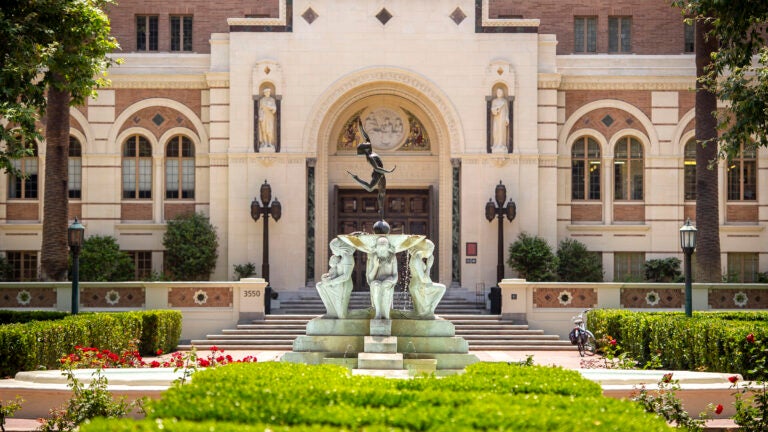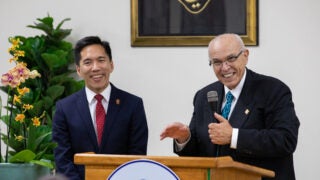
Sororities and fraternities have been a part of USC campus culture since their arrival in 1889, shortly after the university’s founding in 1880. (USC Photo/Gus Ruelas)
National fraternity Sigma Phi Epsilon returns to USC
The USC chapter of Sigma Phi Epsilon returned at the start of the spring semester through a partnership with fraternity leaders and the USC Student Life team.
The USC chapter of national fraternity Sigma Phi Epsilon returned to USC at the beginning of the spring semester. The move is the result of efforts from both the national organization and the USC Student Life Fraternity and Sorority Life team to facilitate positive changes to the local chapter’s structure, programming and campus impact.
“Student leadership and student interests are important across the board at the university,” USC Associate Vice Provost for Student Life Jon Cleveland said. “We have a long history with fraternities and sororities at USC, and we look forward to a long future of strong partnership with chapters and organizations from across the country.”
The national organization mirrored the university’s excitement to shepherd the fraternity back onto the USC campuses.
“Sigma Phi Epsilon has a long and proud history at the University of Southern California,” said Rece Lehman, one of the fraternity’s expansion managers who worked with student leaders to bring the chapter back to the USC campuses. “The re-establishment of our chapter was a top priority for the national fraternity, as they sought to bring the full SigEp experience back to campus by fostering leadership, academic excellence and personal growth for future generations.”
Encouraging accountability
Sororities and fraternities have been a part of USC campus culture since their arrival in 1889, shortly after the university’s founding in 1880. With representation at both the local and national level, these student organizations must meet the principles of wellness, community, academics, service and leadership set by the university and their national organizations.
When student organizations fail to align with university policy consistently — specifically the Trojan Fraternity and Sorority Standards and Accreditation process — the university might ask the group to pause activities for a few years to give attention to any areas in conduct that they need to improve or avoid. The standards provide a framework to ensure that the university’s fraternity and sorority community commit to “the highest quality membership experience focused on academics, civic engagement, wellness, safety and leadership,” according to the university’s standards and accreditation website.
USC’s Student Life team also uses this framework to document and demonstrate growth and guide strategic planning for chapters, the council and the community. The team has taken a leadership role in supporting student leaders wishing to expand within the university’s five fraternity and sorority councils: the Panhellenic Council, the Asian Greek Council, the Multicultural Greek Council, the National Pan-Hellenic Council and the USC Interfraternity Council, the last of which Sigma Phi Epsilon has just rejoined.
Interfraternity leaders meet regularly with the Student Life team to discuss USC standards, council needs and interests. Those meetings have recently included the expansion of the council and the recommendation that Sigma Phi Epsilon be allowed to rejoin.
“We partnered with the student leaders and the chapter’s national headquarters to talk about what that could look like,” Cleveland said, “including university standards, time frame and what the national organization holds as their priorities. We wanted to know how the chapter is in alignment with university values and the expectations we have.”
Cleveland said much time and conversation has been spent making sure that both sides view the students’ recommendation as a positive move for the council, USC’s campuses and surrounding communities.
“As a fraternity, Sigma Phi Epsilon sees itself as a valued partner in higher education,” said Lehman, who added that USC’s chapter has established a network of more than 2,000 alumni and active members since it came to the university in 1927.
The beginnings of a positive trend
USC Sigma Phi Epsilon’s return comes after years of sweeping changes to improve student conduct and safety at the organization’s national level.
Since the fraternity’s departure from USC in 2013, the national chapter decreased its chapter count from 240 to 193 in 2015 in an effort to ensure that the organization is providing the best experience for its chapters.
In 2015 undergraduate delegates voted to abolish pledgeship and adopt a single-tiered membership structure that they hope will provide an easier path to membership. The delegates also passed legislation implementing substance-free housing for all its chapters. In 2017, the organization moved to make all chapter facilities substance-free.
The organization in the early 1990s also created the Balanced Man Program, which Lehman said provides an educational experience to equip fraternity members with the tools to be successful after college.
“They’ve made quite a bit of improvements at the national level that have really amplified their reputation and experience,” Cleveland said. “They cited that the culmination of all these practices have led to a seven-year run with zero risk-related insurance claims. They’re doing good work.”
This is the second year that the university has seen a nationally recognized fraternity return to full USC affiliation after making systematic changes at the national level. Sigma Alpha Epsilon returned at the start of the 2024 spring semester.
Cleveland sees this as a positive trend. “Other national-level fraternities have done similar things to eliminate the pledge program, for example, reducing the opportunity for dangerous practices such as hazing,” he said. “This is a way to facilitate a healthy environment that’s all about friendship and the organization.”
Cleveland added that chapters see significant benefits when they align with university values and codes of conduct, including student development, leadership development, pre-planning and other supports that promote accountability. Organization returning to the USC fraternity and sorority community also must follow a developmental plan which outlines additional advising meetings and an enhanced partnership with the chapter’s headquarters so that there’s a closer partnership — especially in the first year of the chapter’s return.



